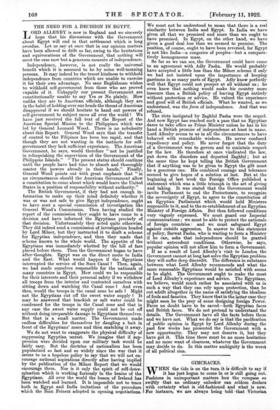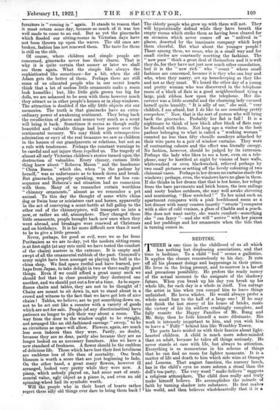GDICRACBS.
WHEN the tide is on the turn it is difficult to say if it has just begun to come In or is still going out. Fashions in unimportant matters box the compass so swiftly that an ordinary onlooker can seldom declare with certainty what is old-fashioned and what is new. For instance, we are always being -told that -Victorian furniture is "coming in" again. It tands to reason that it must return some day, because so much of it was too well made to come to an end. But as yet the gimcracks which flooded our sitting-rooms in Victorian days have not been thrown up upon the waves. The old ones are broken, fashion has not renewed them. The taste for them is still on the ebb. • Of course, where children and simple people are concerned, gimcracks never lose their charm. That is why it is quite certain that sooner or later we shall see them again. What the simple like always the sophisticated like sometimes—for a bit, when the old Adam gets the better of them. Perhaps there are still _ some of us educated people who in our secret hearts think that a lot of useless little ornaments make a room look homelike ; but, like little girls grown too big for • dolls, we are ashamed to be seen with them however much they attract us in other people's houses or in shop windows.
• The attraction is doubled if the silly little objects stir our memories. The truth is that gimcracks have an extra- • ordinary power of awakening sentiment. They bring back the recollection of places and 'scenes very much as a scent will bring it back. Sometimes it seems as though really beautiful and valuable things had less power over the sentimental memory. We may think with retrospective admiration or envy of the real treasures we saw as children in the houses of our grandparents or relations, but not as a rule with tenderness. Perhaps the constant warnings to be careful and not injure them repelled us. The tragedy of almost all early Victorian children's stories turned upon the destruction of valuables. Every clumsy, curious little ' thing knew about "Rebecca Mason" and the handsome "China Bason " which she, when "in the parlour by • herself," was so unfortunate as to knock down and break. But gimcracks, properly speaking, were of far less con- sequence and Rebecca's sad situation had no connexion with them. Many of us remember certain worthless "chimney ornaments," almost is we remember a pet animal. To this day the thought of some white china dog or Swiss bear or miniature cart and horses, apparently in the act of conveying a scent-bottle at full gallop to the other end of the chimneypie,ce, will transport us into a new, or rather an old, atmosphere. They changed these 'little ornaments, people brought back new ones when they • went abroad, and breakages were renewed at Christmas and on birthdays. ' It is far more difficult now than it used to be to give a little present. Never, perhaps, for good or evil, were we so far from Puritanism as we are to-day, yet the modern sitting-room is at first sight (at any rate until we have tested, the comfort of the chairs) austere in the extreme. It is empty and swept of all the ornamental rubbish of the past. Cromwell's army might have been amongst us playing the bull in the china shop. We find space restful and have learned, per- haps from Japan, to take delight in two or three really good things. Even if we could afford a great many such we should feel that in close proximity they destroyed one another, and we should put out a few at a time. As to super- fluous chairs and tables, they are not to be thought of ! Chairs are meant to sit down in, not to stand about in a crowd and witness to the fact that we have got lots of nice chairs ! Tables, we believe; are to put something down on, not to be set out like a counter with a variety of goods which are not for sale. People (of any discrimination) have patience no longer to pick their way about a room. The . way from the door to the window ought to be straight, _ not arranged like an old-fashioned carriage "sweep," to be as circuitous as space will allow. Flowers, again, are much less seen indoors than they were. Partly, no doubt, because they are so dear, partly also because they are no longer looked on as necessary furniture. Also we have a new standard of freshness. A flower should be the emblem of delicious life. Those which have lost their first loveliness are emblems less of life than of mortality. One fresh blossom is worth a score that are just beginning to fade. On the other hand, a great many flowers, however ill arranged, looked very pretty while they were new. A piano, which nobody played on, had some sort of senti- mental value, ugly object as a piano is, and even an old spinning-wheel had its symbolic worth. Will the people who in their heart of hearts rather regret these silly old things ever dare to bring them back? The elderly people who grew up with them will not. They will hypocritically defend while they have breath the empty rooms which strike them as having been cleared for an occasion which never comes off as " unlived in" places, deserted by the inanimate company which kept them cheerful. But what about the younger people ? Those among them, we mean, who in a small way and for small circles are constantly resetting the fashions. The "new poor" think a great deal of ihemselves and it is well they do, for they have not just now much other consolation, but it is the new rich" who " count " where small fashions are concerned, because it is they who can buy and who, when they marry, set up housekeeping as they like and not as they must. We, heard the other day of a young and pretty woman who was discovered in the telephone room of a block of flats in a good neighbourhood tying a large, pink ribbon bow upon the telephone. Her dis- coverer was a little scornful and the charming lady excused herself quite humbly. "it is silly of me," she said, "very childish, I am afraid, but I do like to see something pretty everywhere." Now, that is the sort of person who will bring back the gimcracks. Probably her flat is full! It is a nightmare to think of how block after block of flats may be flooded with them. Not long ago a visitor in the best parlour belonging to what is called a "working woman" counted no less than fifty chenille monkeys attached by their wire paws to a pair of window curtains. They were of contrasting colours and the effect was literally creepy. No fashion, however, should be judged by its extremes. Perhaps the lady who likes to see a bow, even on a tele- phone, may be horrified at night by visions of bare walls, whitewashed or even blackwashed, relieved perhaps by two small pictures or setting off the lovely colouring of two cloisonné vases. Perhaps in her dream no.curtains shade the windows ; perhaps, even, the windows have no glass in them. If she thinks in her dream that that is her home, her refuge from the bare pavements and brick boxes, the iron railings and sooty bushes outdoors, she may well awake shivering and murmuring, "How wretched ! ' To her mind such an apartment compares with a pink beribboned room as a hot dinner with many courses (mostly "sweets ") compares with a slice of cold venison, a glass.of Chablis and a peach. She does not want rarity, she wants comfort—something she "can fancy "—and she will " arrive" with her pianos and her puddings and her ornaments when the tide that is turning comes in.



































 Previous page
Previous page